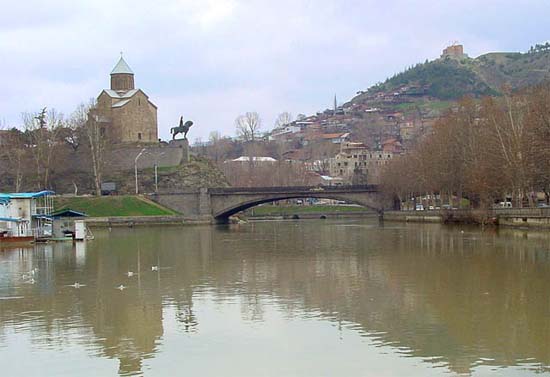
If a country like Georgia – saddled with the weight of a Soviet past, existentially threatened by a resurgent Russia, and both blessed and cursed by its middle-region geography – does not reform boldly (as opposed to injudiciously), its experiment in modernization is likely to unravel and fail. Georgia's economic growth momentum will depend greatly on the availability of skilled and able workers if it is to make the jump from an economy dependent on international aid and rapid construction to one that is more skill based and entrepreneurial (in the broad sense of the word). In this quest, the breadth and quality of Georgia's education sector will be absolutely key.
Georgia RPCV Michael Hikari Cecire writes: Entrepreneurship And Georgia's Future
Entrepreneurship And Georgia's Future
Thursday, May 13, 2010
By Michael Cecire
The Georgian government routinely relies on past years' evidence of economic growth and state modernization as the fundamental pillar in its ‘social contract' with the Georgian population, which continues to pay dividends, according to a recent poll commissioned by the National Democratic Institute. [1] Indeed, there is rarely a speech delivered by Georgian dignitaries to foreign audiences that does not at least allude to Georgia's rapid transformation from its Shevardnadze-era state into something that, if not fully European, at least has the recognizable contours of a Western state.
While understandable, a distant observer could be forgiven for getting the impression that the work in Georgia is mostly done. Despite past economic growth and unmistakable progress in development, the rising towers in Tbilisi and the coiffed parks in Batumi obscures a reality that Georgia has much more to do if it is to live up to its potential.
From an economic development standpoint, Georgia is currently suffering from two competing phenomena. First, the economic crisis, though relatively subdued in Georgia compared to many other countries – which might be primarily owed to the massive cash infusions from foreign donors after the August 2008 war – has taken its toll and brought economic growth in the ‘Caucasus tiger' to a halt. Second, Georgia's economic growth has been particularly reliant on enterprises that have overwhelmingly been concentrated in major urban centers – especially Tbilisi and Batumi, and in Kutaisi, Poti, and Gori to a lesser extent – and benefit a certain class of people with certain education credentials (and I stress credentials over skills), who are a relatively small portion of the Georgian labor force.
In addition, Georgia's unemployment rate, which hangs at around the mid-teens mark, woefully understates the labor picture as many people who are considered to be ‘employed' for statistical purposes are also underemployed – that is, they are hindered by insufficient pay, irregular or seasonal employment, and have few options for increasing their economic mobility. Unfortunately, the checkered access by many Georgians to legitimate higher education and, more importantly, to institutions that actually confer usable employment skills means that this number is not likely to improve significantly in the near future without dramatic changes.
But ‘dramatic' does not necessarily mean quick. In this case, there is a decided shortage of skilled workers that cannot be remedied by the kind of quick, shock-treatment solutions that have accompanied economic liberalization and institutional reforms. In some ways, this kind of treatment by the government to education, where reform processes have been fitful at best, may have an overall deleterious effect. In many schools and higher education institutions, there remains a great deal of uncertainty over the place, pace, and rationale for a number of reforms. This is to such a degree that students routinely have their curricula changed mid-stream, their requirements modified, and their actual learning process routinely interrupted. It's no surprise that graduates of such environments may often lack the proper background to break into the labor force. Not that it always matters, as employment is generally regarded as being more a function of personal connections than skills or ability.
For older workers, there are even fewer options. Many, who are either unemployed or consigned to perpetual underemployment, do not have many outlets for expanding their skills or finding opportunities to be hired at an advanced age – unless, of course, there are strong personal connections involved.
Georgia's economic growth momentum will depend greatly on the availability of skilled and able workers if it is to make the jump from an economy dependent on international aid and rapid construction to one that is more skill based and entrepreneurial (in the broad sense of the word). In this quest, the breadth and quality of Georgia's education sector will be absolutely key.
There are a few items about Georgia's situation that should be considered in the context of future economic development. First, Georgia is a small country. Georgia's total land area, even including the conflict zones, is only about 70,000 square kilometers (or about the size of South Carolina). Because of Georgia's mostly mountainous topography, much of Georgia is ill-suited for intensive agricultural uses, which is the sector in which the majority of working Georgians are occupied (although one may not know it in Tbilisi or Batumi). Although there are niche areas where Georgian agriculture has growth potential, the Georgian economy will never boom based on agricultural output alone, no matter how efficient. Even those famous Georgian wines can only succeed in global markets as a specialty good in niche markets, and not on volume. [2] By this reality, Georgia's future in the global marketplace must lie in the development of human capital.
Second, successful countries to which Georgia is often compared, like Israel and Singapore and Switzerland, became economically strong not primarily on natural resources (Israel, for example, has almost none) or even on compelling pro-business policies (though this does help), but on the aggressive cultivation of human capital. As these countries skillfully demonstrate, there is more to economic development than building favorable structures and institutions to attract investment. Not that this isn't important, but it's only a first step. [3] Instead, these countries developed strong societies and strong economies by investing in their populations, expanding education quality and access, and reinforcing a culture of entrepreneurship. It is this latter element that is crucial – developing a cultural notion that starting something new, creating and innovative is not only desirable, but possible. While this is not something the government can directly legislate, obviously, it can be nurtured through indirect means.
Streamlining government to make the environment more favorable to businesses is a good first step, but it's only a first step. The state can also lead by example by decentralizing the state, empowering its workforce, and encouraging entrepreneurship through strong bankruptcy protection laws, incentivizing risk-taking, helping to cut barriers for access to capital for would-be entrepreneurs, and prioritizing openness and the freedom of information to the general population. This last item is not just a rhetorical nod, but critical in fostering a culture of risk taking and innovation. A society that is accompanied by intangibles like a truly independent media, a transparent government, and a credible system of meritocracy all contributes to developing an entrepreneurial culture. Greater perceptions of social limitations and obstacles create cynicism, while the inverse contributes to risk taking and innovation.
Third, even if Georgians have access to capital, innovative ideas, and a realistic belief in their ability to make a difference, they are still likely to fall short if they cannot access skilled labor to bring their ideas to fruition. In this, the government has a very clear role: facilitate the training of Georgians in areas – both quantitative and qualitative – that will allow them to either have or to be as close to having the skills necessary to act on their ideas. The government needn't impose specific curriculums on education institutions so much as develop certain standards. Higher education institutions could also reflect this need by adjusting their graduation requirements to pair theoretical and analytical studies with technical components.
Consider the possibilities, as an investor might, of a Georgia where the average university graduate is armed with both analytical and technical skills, raised in a system that places an emphasis on the free exchange of ideas, and where the labor force innovates out of habit. Consider the economic potential of a country where a university graduate in American Studies also has an accompanying certificate in statistical analysis, or where an Engineering student also has strong coursework in journalism, or a Management student understands Geographic Information Systems. And consider if all these people are inclined towards creating thing and finding ways to innovate.
These scenarios aren't just limited to Georgia and would be a boon even in places like Singapore or even the United States. But that's just the point. If a country like Georgia – saddled with the weight of a Soviet past, existentially threatened by a resurgent Russia, and both blessed and cursed by its middle-region geography – does not reform boldly (as opposed to injudiciously), its experiment in modernization is likely to unravel and fail.
Michael Hikari Cecire is a writer and independent analyst living in Tbilisi. A former Peace Corps Volunteer in Georgia, he is a frequent commentator on economic development and South Caucasus policy issues. In addition to Evolutsia.Net, Cecire has also written for the Caspian Business Journal, the London Telegraph, World Politics Review, and TCS Daily, among others. This article first appeared at Evolutsia.Net, a news and analysis blogozine covering the political landscape of Georgia republic.













